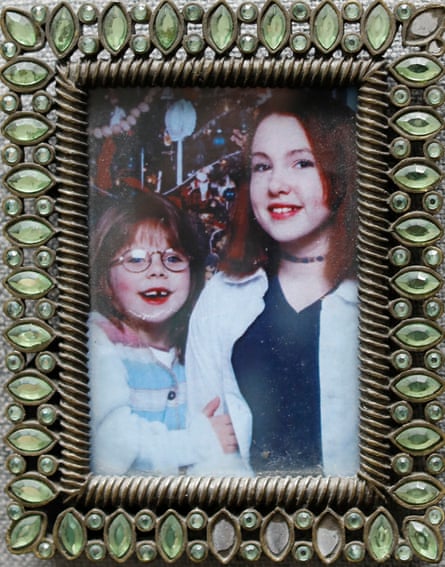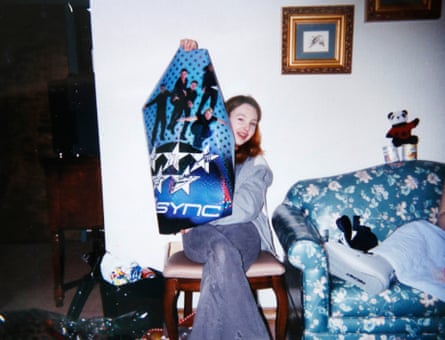
In previous, shorter standup shows, Krystal Evans tried to talk about her childhood experiences, but to say it didn’t work is an understatement. “Audiences just freak out,” she says with a laugh. “You can’t throw in a fucked-up joke at a 20-minute spot on a Saturday night, with a bunch of hen nights in. I realised you have to do a full show about it for people to accept it.”
Evans’s show, The Hottest Girl at Burn Camp, is about to open at the Edinburgh festival fringe. In it, she recounts a childhood that involved intense grief, neglect, surviving a lethal house fire and coping with a mentally ill mother. None of which, admittedly, sounds funny on paper, but Evans is confident in her show, unlike her previous attempts at talking about it. “I think it was a combination of not doing it in the right way and not being an experienced enough comedian at that point.”
This is her first hour-long show, although she has done shorter spots at Edinburgh, where we meet in a cafe. She is American, but lives in the city with her husband (a chef) and their two children. It was after the birth of her second child, now three, that she developed postnatal depression.
“I started getting what I guess you’d call PTSD,” she says. She would have horrible, intrusive thoughts and thought she could smell smoke all the time. She saw a therapist, who suggested to an oblivious Evans – she laughs as she recounts it – that this might have something to do with the house fire she had survived at 14. “I was like: really?” she says. “Because I hadn’t thought about [my childhood] in so many years, I was in denial that it had really affected me.”
Evans, 36, grew up mainly in Washington state. Her mother has bipolar disorder and they would survive on her meagre disability benefits. “We would move once a year, or more, and it was because my mom was unstable. We would not pay rent, or be running away from an unsafe person or a bill collector, whatever.” Her mother and father had her in their early 20s, but split up when Evans was one. When Evans was eight, her mother had another daughter (with a different man), Katie.
As a child, Evans saw her father some weekends and holidays, “but we moved so much … there were big periods where I didn’t see him very often and he didn’t have any control over that”. It meant there was no stability. Evans found it hard to make friends at her various schools because she was never there long enough. It also meant she didn’t have a sense of “normal” family life to compare with hers, which was chaotic and neglectful.
Evans was 14 when what she calls “the turning point” came. They were living in Sequim, a town about two hours north of Seattle, in a mobile home park. In the middle of one night in March, their mobile home caught fire. “I woke up in my bed and there were already flames in my room,” she says. “The room was so unimaginably hot it was like being in an oven.” She got under a desk in her room. “I couldn’t breathe when I was standing up, so I got down on the ground, where there was a little bit of oxygen.” The small windows were double-glazed and didn’t open, but slid sideways, so she knew she would have to break them to escape. She pulled the printer off the desk, stood and smashed it against the first layer of glass, then took a drawer out of the desk to smash the second. “Because of the oxygen [from the open window], the flames came toward me faster. I got this scar,” she says, showing a welt on her right arm – “I think from putting my arm on the metal frame when I pulled myself out. I didn’t feel anything happening at the time, it was just all adrenaline.”
It sounds as if she had been really sensible and capable as a child, and she says she was. “Everybody would tell me: ‘You’re so mature.’ Looking back, that’s fucked up. That’s a theme in my childhood: that I always had to be the adult.” She ran to a neighbour’s home and called the emergency services. Her mother had managed to escape out of the front of their home. She had been badly burned but she was conscious, “lying on the ground, moaning and crying”.
Katie, Evans’s six-year-old sister, died that night. Their mother, as far as Evans can tell, made no effort to get her children out. “Who knows what people choose to do when they’re literally running through flames? I don’t know. It’s hard to be judging someone – I don’t want to do that to my mom – but also I was the child and she was the adult. I have kids now, so I know my instincts.”
At first, a neighbour took Evans into her house, which is when she first realised she had been burned. She was in the bathroom. “I looked in the mirror and I looked down, and all the skin was off my arms and hands. My face was black with soot and very red. My reaction then was shock – I didn’t feel any pain.” The right side of her body had been burned from the heat the fire had generated. When an ambulance arrived, Evans was sedated so her burns could be temporarily dressed, then she was airlifted to hospital in Seattle, where they had a children’s burn unit. She woke up in intensive care, heavily bandaged, and was on oxygen for several days.
Evans was in hospital for about six weeks. Then she was discharged and lived with her father in Seattle for several more weeks. Her grandparents, who had lived in Oregon, moved back to Sequim with Evans after that so she could return to school; her mother, who required more treatment, was still in hospital. “I was lucky that I did have good adults in my life,” says Evans. “I think that was a really big turning point, being like: ‘Months have gone by and nothing insane has happened. I have clean clothes, there’s always dinner on the table, the house is tidy, nobody’s fighting or screaming, there’s no weirdos at the house, there’s no crisis.’”
She coped with the trauma and grief at the loss of her sister, she says, through “utter denial”. Mostly she remembers a feeling of humiliation – at people’s pity, at her scarring, at the bag of secondhand clothes she was given in front of her classmates because everyone knew she had lost everything. She had therapy but didn’t find it useful. “I really was closed off,” she says.
When her mother came back, Evans says she felt “rage” towards her. She couldn’t entirely understand it at the time, but looking back it was because the things she had always hated – her mother’s sense of victimhood and sympathy-seeking – ramped up unbearably. Before, she says, “things that had happened were brushed aside as bad luck, but all these dangerous things kept happening. She was always searching for sympathy, and this was the ultimate sympathy.” Her mother, says Evans, would tell everyone, including strangers, about the fire. It infuriated Evans.
Her mother, she says, would try to “make me open up and cry about it, and it just felt disgusting to me”. It felt manipulative, she says, not caring. “I didn’t feel safe to talk to her. So I just shut down for many years.”
It’s hard now for her to talk about her sister, partly because her memories are not very strong. “I haven’t done loads, personally, to preserve her memory, because I was trying to block out that whole period of my life, and I didn’t want to talk to my mom about it. So it’s been something that I don’t talk about, or think about, maybe because, up to this point, it’s made me feel very vulnerable.”
It took a while for Evans to come to terms with the way she looked in the weeks after the fire. At school, she would wear long sleeves to cover up. But her burns healed well and faded; there is still scarring on her arms and forehead, but it is not obvious. At 18, she moved to California and attended a performing arts school, and by then she cared less. Still, she says: “When you’re a young woman in our society, people think they own women’s bodies; they comment on them all the time.” In her 20s, her scars were “always on my mind, because people would constantly ask me about it. As I got older, and now I’m in my 30s, hardly anyone ever asks me about it, so it’s been easier for me to forget about it.”

She says she felt “very disconnected” in her 20s. She was living in New York, doing “crappy jobs” and flitting from one thing to another. “I’d be like: ‘I’m a photographer, I’m a professional poker player.’ I tried so many things and I would never stick to any of them.” She had always loved comedy and wanted to be a standup, but didn’t want to be too visible – partly because she was embarrassed by her scars and had become used to hiding as a result, but also because drawing attention to herself “was what my mom does”. She wrote comedy, but never performed anything.
Evans met her husband, Stuart, in New York and they moved around, eventually settling in Edinburgh; he had worked for Gordon Ramsay and now has several of his own restaurants. When their first child was born, when Evans was approaching 30, she says, “I looked at this baby and was like: I don’t want him to look up at me and see a husk of a human being. I don’t want to just be the person that supports her husband’s job and doesn’t ever pursue anything.”
She signed up for a five-minute slot at a comedy club, and became a standup comic at the age of 31. Humour has been a huge part of her coping mechanism. “That’s one of the best things about my childhood, the good part of my mom – she’s hilarious. That whole side of the family is hilarious, very creative. My aunt is the funniest person I’ve ever met. I have all these memories of her making the darkest, most inappropriate joke, at the most inappropriate time. The best moments of my childhood were that, laughing so hard.”
Therapy was hugely beneficial, but so is what she calls, with a smile, being “boring-ass normal” after her chaotic early life – cooking, gardening, exercising. Having her own children has also been healing. “To have them go through the ages and the stages, and have a completely different experience growing up than I did, and be like: ‘Wow, I have really levelled up.’”
Writing helps, too. Last year, Evans went back to Sequim and visited her sister’s grave, and the place where their home burned down. She is considering writing a memoir. Creating her show has been cathartic.
“It massively helps me to talk about this stuff on stage, in my own words, and say my darkest thoughts and have people not reject me or call me crazy, but in fact the opposite. That’s the best, most satisfying thing: when you say something [bleak], but we can still laugh about it. Everything’s OK, we’re not all doomed. Life is tragic, and sad, and happy, and hopeful.” She says she feels embraced by the audiences who have seen previews of the show, and she has had a lot of messages from people who say it reminds them of their childhood, or parent.
Is she nervous about her mother seeing it? No, she says. Evans isn’t particularly worried about her mother being exposed – she changes her name and moves around a lot. They talk on the phone very occasionally; once was after her mother had seen a clip on Evans’s Instagram account of her standup, which included material about her family. “She said: ‘Why did you lie about me?’ I was like: ‘That’s not a lie.’” Her mother relented. “It wasn’t even anything about the fire; it was just a random thing. If she finds out about the show, I’m ready for that. I have confronted her about everything multiple times and it never makes a bit of difference to her.”
Evans acknowledges that her mother is mentally ill, but “what my mom never did is find proper help, and she’s never addressed it”. As her daughter, she says, “I didn’t deserve to go through what I went through.” She is not worried about her mother’s reaction, if it comes. “I know that maybe sounds heartless, but I feel like she’s the reason I didn’t do things for so many years, and I can’t let the way she is stop me from wanting to tell my story.”
The Hottest Girl at Burn Camp is at Monkey Barrel Comedy (The Hive 2), Edinburgh, 2-27 August.


